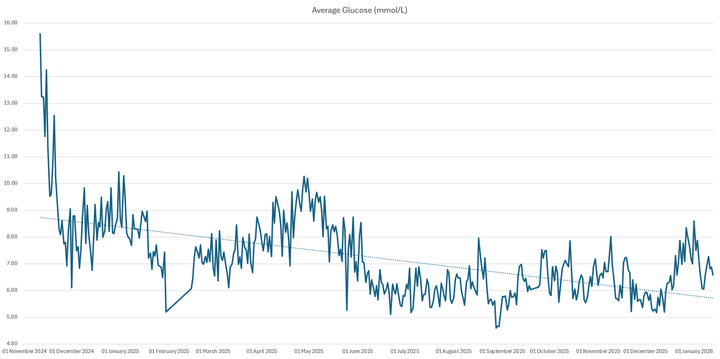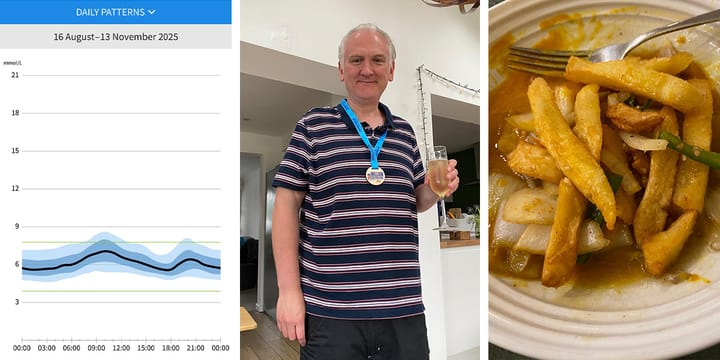War on Diabetes Newsletter 21st June 2025
Welcome to the second War on Diabetes newsletter, your weekly tips and ideas from someone who has had diabetes for five years and learned a lot about it. It's a practical and actionable guide to things your doctor might not be telling you about.
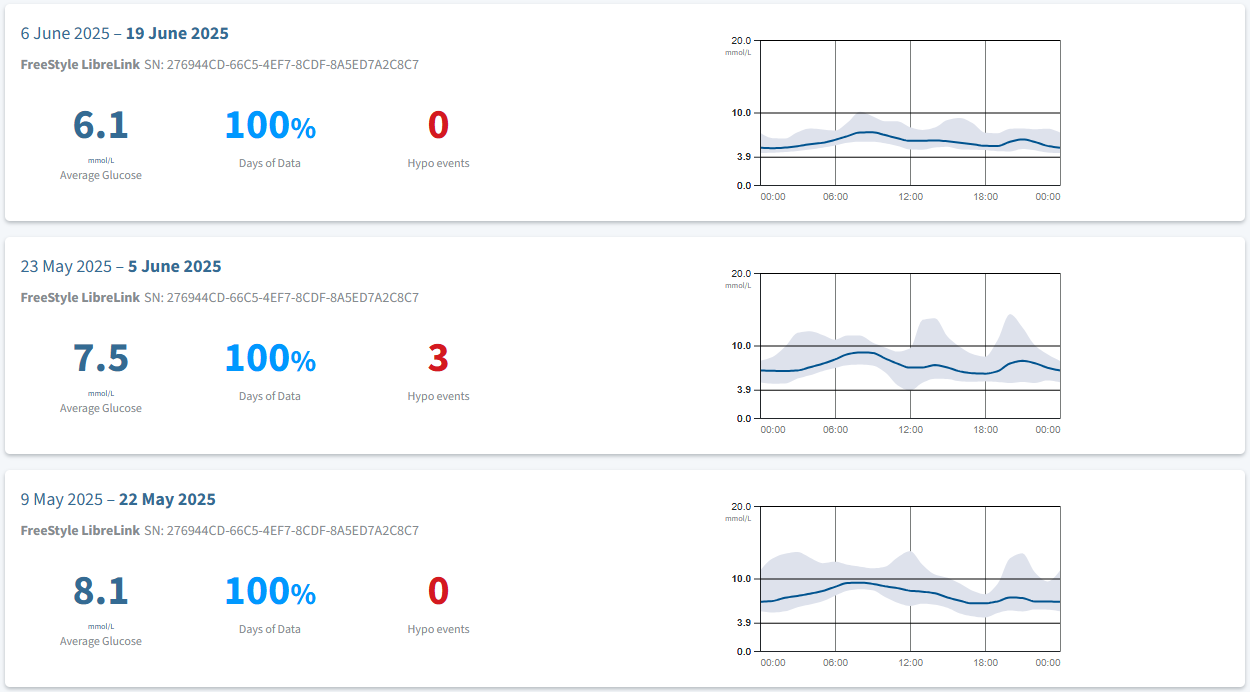
Welcome to the second War on Diabetes newsletter, your weekly tips and ideas from someone who has had diabetes for five years and learned a lot about it. It's a practical and actionable guide to things your doctor might not be telling you about.
This week started off with a bit of a bump in the road - Father's Day beers stalled my progress, but there's going to be ups and downs and some days I just need to feel at least a little bit 'normal' and that's okay.
I've learned some interesting things this week, such as alternate-day-ketogenic eating (a term which I think I've just made up - I haven't read anything about it) and also that not everyone gets dawn phenomenon.
I'm also managing to get into a better routine of posting video content and have had a couple of refreshing rants about the endless low-fat diet dogma, Ancel Keys, and mangaged to get triggered by Sir Keir Starmer's type-2 fat-shaming contribution to diabetes week.
My rant about low-fat and "good" sugar nonsense from Diabetes UK
Sir Keir contributes to the fat-shaming stigma around type-2 diabetes
What I learned this week
Some people don't have the dawn effect, I set a beer limit and have an epic boomeresque videography fail.
Read moreProgress Update
Read moreThis week's food heroes:
Cod, Eggs & Sprouts
I've included this one as it was a great (albeit late) start to my meal routine on my 'normal' glucose day. It makes sense - fish is a great source of protein and pretty much 0 carb. Eggs are also high protein with a decent level of fat to fill you up. I've reverted to frozen veg as I haven't had chance to do a decent food shop this week so frozen sprouts might have been the real secret... I'll try them again with something else and see if they are indeed more powerful than I could possibly have imagined...
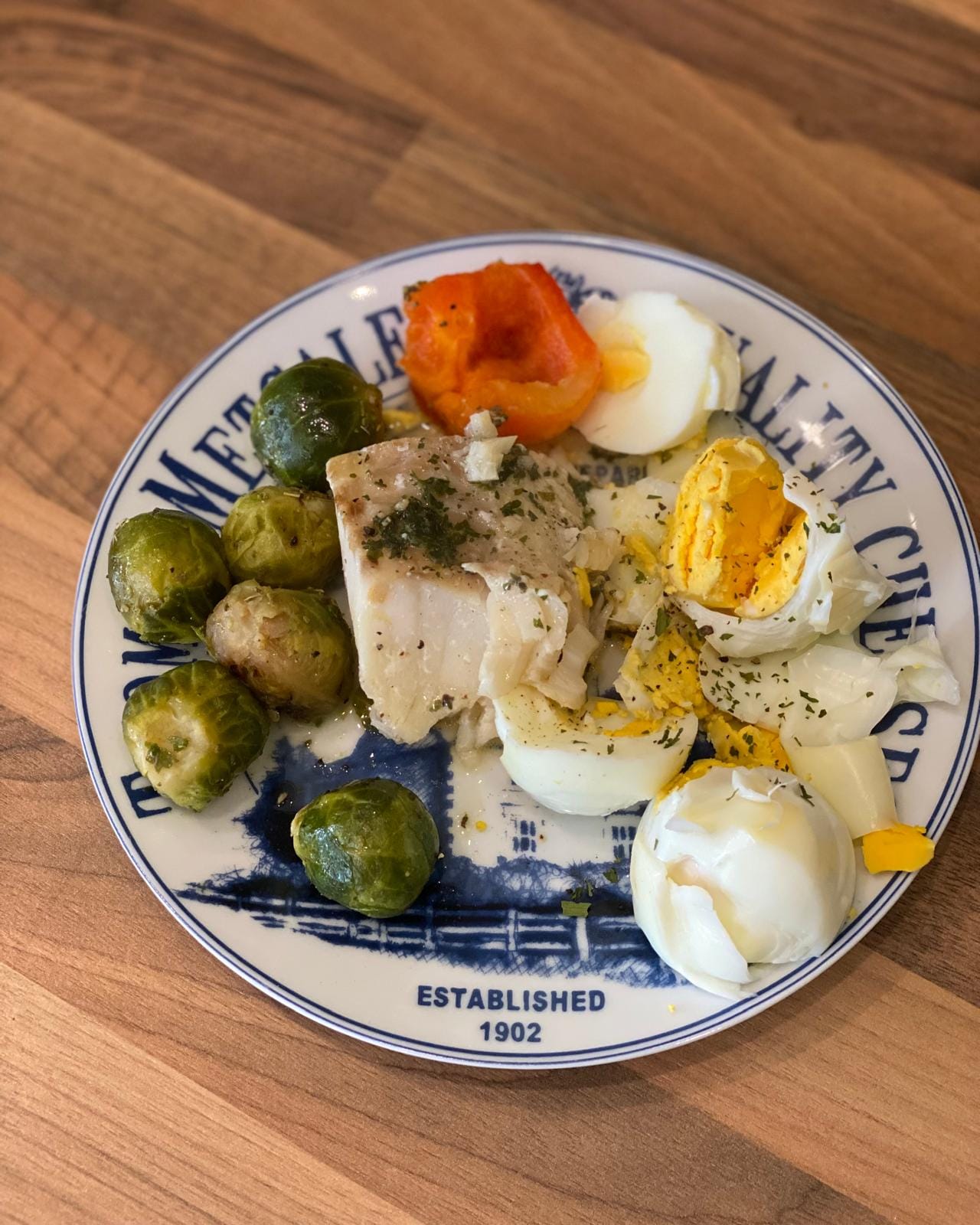
Roast Beef, Veg & Roast Potatoes
Roast dinners have always been my reliable stalwart for keeping glucose down. Beef and lamb seem to perform best. This was my evening meal the day before I had my 'normal' glucose day so I'm working on the theory that this is the kind of meal that sets you up well for the next day. Eating it around 7pm also helped with not being too late. It would still be better to eat at 6pm but that's just not possible for me after a commute back from the office. A small portion of roast potatoes seems to be fine for blood glucose control if you eat them at the end of the meal (start with the crucifers). I've found any other form of cooking potatoes tends to cause more drastic spikes and I avoid mashed potatoes with a feverish fanaticism.
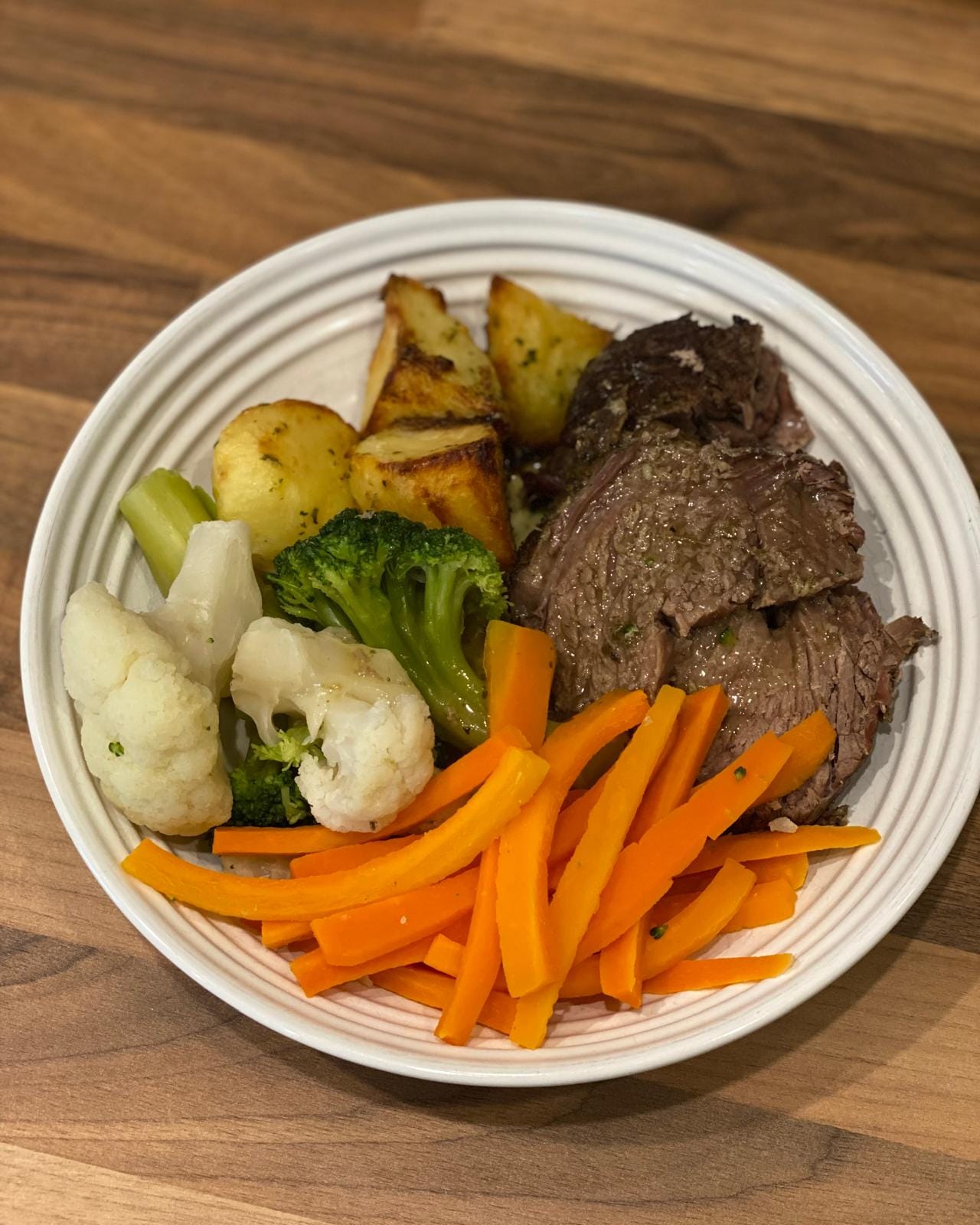
Mixed Grill
I remember my late grandmother ordering a large mixed grill and and me holding my head in my hands as she gleefully declared to the waiting staff that she couldn't have the chips because she had diabetes... I was wrong to have a derisory opinion on this (although I was right in confiscating her Lucozade). It was many years before I ended up with type 2 diabetes and was still hoodwinked by the low-fat mantra at the time. This is a fabulous pub meal in a sea of stodgy brown-beige carby options. I offloaded most of the chips and have been back for another go and ditched them altogether. Frustratingly, they've taken the salad swap option off the menu - that would be ideal. This will keep you full for most of the day and it doesn't spike my glucose levels.
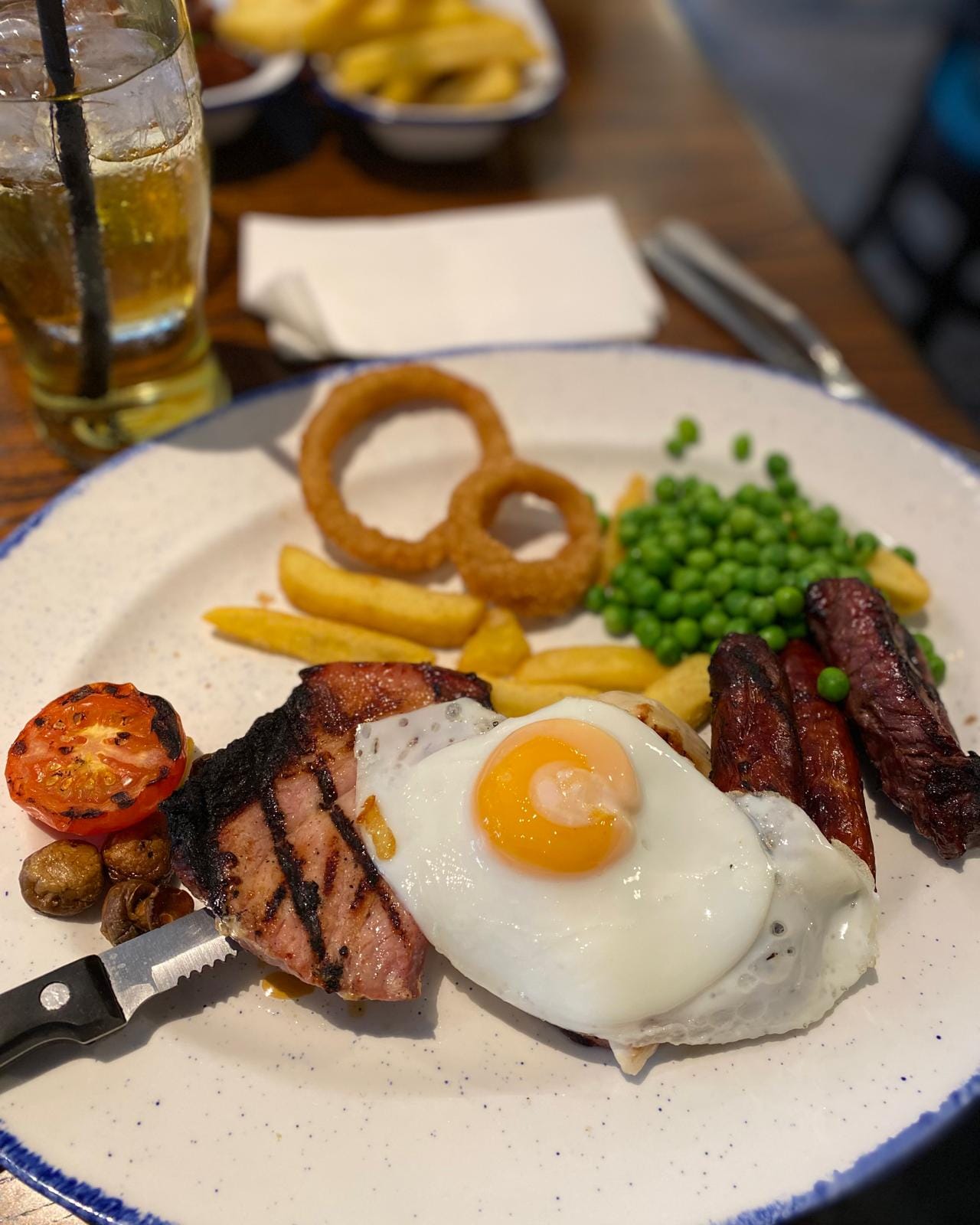
New Recruit Tip
Learning what to eat and drink in order to manage or reverse type-2 diabetes is incredibly challenging, especially when you first start. There are so many people offering conflicting advice: low-fat, high-fat, high-protein, keto, calorie-restricted shake diets, pro-dairy, anti-dairy, anti-seed oil, pro-olive oil, good fats, bad fats, good sugar, bad sugar, fasting, intermittent fasting, fibre vital, fibre not important, low-carb, and even some promoting high-carb vegetarianism (which can work but you're making it really hard for yourself). I discuss all of this on the Facebook and Instragram pages and you can scroll through my daily stats update galleries for food and drink ideas with actual glucose response data to show what works and what doesn't. The first thing I'd look at if you're just getting started is breakfast - get rid of the breakfast cereal. "Heart-healthy whoelgrain" is a marketing ploy designed to get you to buy the stuff the food industry makes more money from. Meat, eggs and full fat Greek yoghurt with nuts & berries are my go-tos... and if you have type-2 diabetes, it won't do you any harm to skip breakfast altogether if you can manage that around any medications (do speak to a doctor before skipping breakfast if you're on glucose-lowering medications).
Follow War on Diabetes on Instagram for simple food ideas that I find work wellDiabetes Veterans
How was your last diabetic review? I had mine last week and something struck me as rather odd. Even though my HbA1c had remained level and well within target, and my 7-day average was coming down, I was still given a list of medications and their benefits that would be helpful if my glucose control worsened. This list was delivered with some level of excitement which I just found a little troubling. I've lost about 4lbs in the last couple of weeks after a long period of being stuck at around 15.5 stone. I still need to lose weight but I'm already doing that, so it struck me as bizzare that the subject of GLP-1 agonist medications such as Wegovy and Ozempic came up. I shut the conversation down by asking why I'm being recommended drugs with potentially dangerous side effects for someone who's already losing weight and has good glucose control. So what are the side effects? Common ones are general discomfort such as vomiting, diarrhoea, constipation and headaches. One of the less common but much more serious side effects is pancreatitis - inflammation (i.e. damage) to the most vital organ involved in insulin production - the thing we are trying to save in management of type 2 diabetes. Other potentially dangerous side effects include inflamation of the gallbladder - usually caused by gallstones blocking bile drainage, kidney damage relating to excessive dehydration from nausea and/or diarrhoea, and also the new one that's just made the news... delayed gastric emptying... which sounds good as part of dampening appetite, but this also blocks the normal absorption of nutrients and other medications such as the birth control pill - i.e. another unexpected side effect that no one was warned about is pregnancy. These drugs have also been shown to produce thyroid cancer in animals and there is also a small increase in the risk of developing suicidal thoughts. If you're desperately struggling with weight loss and you're having real difficulty with changing your diet and lifestyle then these drugs may still be worthwhile considering as they can help people lose a lot of weight by supressing appetite. They are also considered to be a lot safer than bariatric surgery - they're effectively a chemical version of a gastric bypass. What I've heard more generally about these drugs, which is why I am doing my best to avoid them, is that people coming off them find an insatiable appetite returns leading to them gaining more weight than before they started. That's pretty much the same problem with low-calorie diets that have been popularised since the 1970s as a temporary measure to 'get back into shape' and yet obesity rates have soared. Following a period of temporary calorie deficit, the body tries to prepare itself for future starvation-survival by trying to stock up more for the next time. The last thing to consider before deciding on using these drugs is how long have they been in general use? Generally for around 18 years, and Ozempic was only approved for use by the NHS in 2019. Pregnancy has only just been publicised as a potential side effect and I'm erring on the side of scepticism that potentially a few more will be found in the coming decades.
Recommended reading - Mark Schatzker "The Dorito Effect". Mark explains how our tastebuds have been hi-jacked in order to drive addictive eating behaviourSponsored
I struggled to find where to buy non-homogenised milk locally and eventually found The Modern Milkman. Their organic whole milk in my area is non-homogenised so I've been getting milk and eggs from them for two yeas now. Use this link to get 50% off your first two weeks and they'll give me 50% off my next delivery as well. Cheers!
